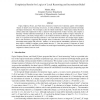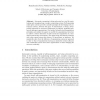346 search results - page 1 / 70 » Logical omniscience as a computational complexity problem |
TARK
2009
Springer
13 years 11 months ago
2009
Springer
The logical omniscience feature assumes that an epistemic agent knows all logical consequences of her assumptions. This paper offers a general theoretical framework that views log...
TARK
2005
Springer
13 years 10 months ago
2005
Springer
Fagin, Halpern, Moses, and Vardi have proposed a framework of epistemic agents with multiple “frames of mind” (local-reasoning structures), to solve problems concerning incons...
LOGCOM
2007
13 years 4 months ago
2007
The syntactic approach to epistemic logic avoids the logical omniscience problem by taking knowledge as primary rather than as defined in terms of possible worlds. In this study, ...
FCT
2003
Springer
13 years 9 months ago
2003
Springer
Abstract. In the paper we present a purely logical approach to estimating computational complexity of potentially intractable problems. The approach is based on descriptive complex...
ATAL
2008
Springer
13 years 6 months ago
2008
Springer
Abstract. Autonomic computing is being advocated as a tool for maintaining and managing large, complex computing systems. Self-organising multi-agent systems provide a suitable par...


